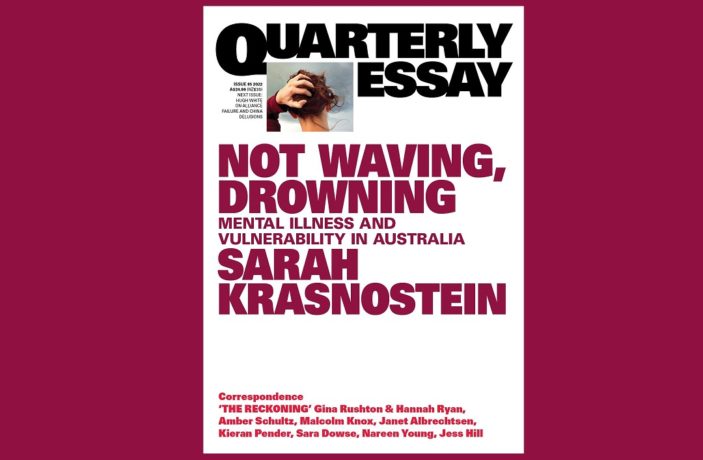
Issue 85 of the Quarterly Essay is a timely one. The Trauma Cleaner’s Sarah Krasnostein offers a well-researched and insightful look into Australia’s mental health care systems, and its intersection with other institutions. The essay draws upon extensive research and first-hand case studies with vulnerable individuals who fell through the system’s cracks when they should have been offered the utmost care.
Krasnostein has a doctorate in criminal law and has worked extensively in this arena. She credits the initial seeds of her essay with her work in the criminal justice system. Over the years she was introduced to many individuals that had received inadequate care from various providers (such as in healthcare and education) which often lead to devastating consequences such as incarceration.
Drawing on Australia’s chequered history with mental health, in around 40,000 words Krasnostein traces back issues in this sphere to colonisation and the massacres of Indigenous populations. She connects the dots between the first purpose-built psychiatric facilities at Tarban Creek in NSW and Yarra Bend in Victoria to newer iterations at Kew, and then through to today. One thing that is clear through all history (and irrespective of which political party was in power) is how grossly underfunded and under-resourced these institutions are.
In her commentary, Krasnostein references the various public enquiries that have taken place into mental health over the years. Sadly these investigations have offered up recommendations that often fallen on deaf ears. One hopes that Krasnostein’s essay doesn’t offer the same fate, as this is another strong voice in this field.
Krasnostein shines a light on a broken system by enabling further debate and discussion. She notes that we are moving towards a more Americanised healthcare system and this has dire consequences for patients, especially those with many disabilities or comorbidities. These people are especially vulnerable as they often fall under the remit of many departments but no one has a clear oversight or accountability. This means they can fall more easily fall through the cracks.
Another issue Krasnostein explores is the stigma attached to mental health. Her hope is to try and normalise things to avoid the ‘othering’ that has taken place for too long. It is only then that we can truly empathise with those people with mental ill health. This is important as one fifth of Australians each year are reportedly affected, and this has likely been exacerbated by recent events like the pandemic.
Not Waving, Drowning is a beautifully written and well-constructed essay. It is disarming, visceral and heartbreaking in parts as you read about the systemic issues in an environment that is under severe stress. Krasnostein’s long form essay unpacks a lot of the complexity and explores many different themes. She ultimately make the case for real reform for a system that is long overdue.
FOUR STARS (OUT OF FIVE)
Quarterly Essay 85: Not Waving, Drowning by Sarah Krasnostein is available through Black Inc. Books. Grab yourself a copy from Booktopia HERE.
